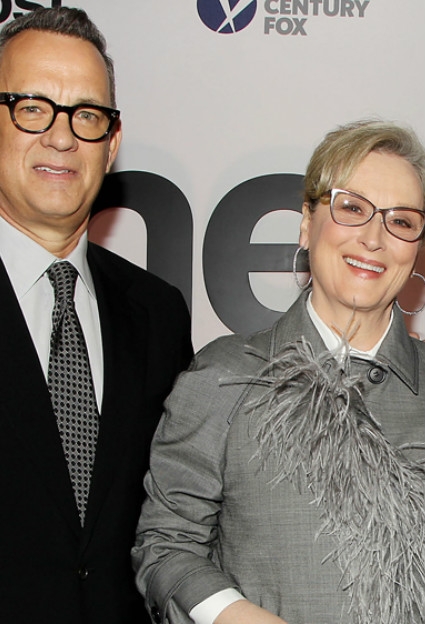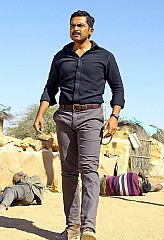The Post - Visitor Review
Home > Visitor Columns

Behindwoods.com isn't responsible for the views expressed by the visitor in this column. The visitor claims that this column is his/her own. If the column infringes any copyrights that you hold, please email us at columns@behindwoods.com.
The Post is Spielberg’s 30th film since the groundbreaking Jaws came out in 1975. The master craftsmen had been busy prepping his film The Kidnapping Of Edgardo Mortara which had a Tony Kushner script. He was also involved in the post-production of The Ready Player One which is incidentally due for release on March 31. Amidst all of this, Spielberg stumbled upon the script of The Post by Liz Hannah and decided to immediately bring it to screen.
The movie is based on a true story - of the publication of Pentagon papers which exposed lies of the US Government, one administration after another, about the Vietnam War. It also features many real journalists who were part of newspapers at the time. Having grasped the urgency to tell this story now more than ever, Spielberg finished The Post film in record time - screening the film a mere nine months from the time of hearing the first draft of the script.
Maestro John Williams has collaborated with Spielberg yet another time in what is a repeat of one of the most important musical collaborations in Hollywood and motion pictures per se. Williams conjures up a very understated and effective musical score for this screenplay, which comprises mostly of people talking in rooms. The music lurks just around the corner when the story is set up, and as events re set in motion, the tension is ramped up which then ends in a moving crescendo; typical of Williams. At the age of 85, he shows where, when and how to score with precision.
Cinematographer Janusz Kaminski has been working with Spielberg since Schindler’s List and has once again stamped his presence with his lighting and camera pans. The typical Spielberg-ian shot of a moving car, tracking from its window-side into the center, is present here too. Only with a visual storyteller at the helm, can shots like the reflection of a bewildered and trembling Odenkirk in a public telephone booth be filmed. The tone of the screenplay is kept intact with Kaminski’s trademark lighting-source-within-the frame-technique. In newsroom sequences where that technique is not available, the tone is obtained by ceiling lightings. Intriguing, non-jarring pans in circular motion convey the conundrum that Meryl Streep’s Graham finds herself in. Shot on film, Kaminski realises Spielberg’s penchant for storytelling like no other in The Post.
Production designer Rick Carter (another known Spielberg collaborator) gets the immaculate details of time and space of the film -set in 1971 - exactly right. Be it the newsroom, houses or the print machines, his production design brings a tremendous sense of authenticity and a feeling of nostalgia. Carter is also one of the major reasons the film has come to be made within such a short span of time. Editor Michael Kahn (another longtime associate) along with his assistant Sarah Broshar has paced the film to less than two hours, only retaining the core pulp without compromising on exhibiting the performances of the leads. Editing is neither rushed nor slow, and remains focused on the narrative. Special mention to the intercuts/parallel scenes which are handled with ease.
Casting in the film is the sort only Spielberg can pull off. Led by Tom Hanks and Meryl Streep (who are working together for the first time), the film boasts of some of the best supporting actors put together on film in recent times. Bob Odenkirk (Known for Breaking Bad & Better Call Saul), Sarah Paulson (American Crime Story), Matthew Rhys (The Americans), Carrie Coon (Fargo Season 2), Micheal Stuhlbarg (Boardwalk Empire), Bradley Whitford (West Wing), Bruce Greenwood and the Matt Damon lookalike from Bridge of Spies.
Nothing short of a casting coup and a talent heist.
Meryl Streep as Katherine Graham delivers one of the best performances on screen this year. In every scene, the character evolves with her performance and there isn’t a moment where she isn’t reacting in a scene she finds herself in. The performance was so natural and sublime that she makes the audience put themselves right in her shoes. Tom Hanks plays Ben Bradlee, whom he had the opportunity to know in person, and that shows in his performance. The relentless journalist with the guns-on attitude is again made very believable by Hanks, in his fifth movie with Spielberg. The delivery and timing of the lines by the leads are a treat. Rest of the supporting cast, led by Odenkirk, bring an incredible sense of time and belonging to the proceedings.
The story and screenplay, written by debutant Liz Hannah, re-written by Josh Singer (known for the Academy award winning Spotlight) at the behest of Spielberg is layered - and touches upon many themes and taboos prevalent in the seventies which unfold as a thrilling drama. The attention to detail at the script writing level is transparent and Singer’s involvement makes sure it’s a well written, journalistic film.
Direction by Steven Spielberg is master class in visual storytelling. The way the characters are introduced and scenes are staged, riddled with visual metaphors, speaks volumes of his craft. The manner in which the camera moves in the film itself narrates and conveys more than pages of dialogues; the framing in Spielberg films is still the best. At the very heart of Spielberg’s narration lies Katherine Graham, the first woman to head/own a newspaper, dealing with a room full of men who look down upon her - and what it takes for her to make the decision of her lifetime. In the same breath, the kind of equilibrium he brings to the story while intertwining both is just mastery.
We need media owners like Washington Post’s Katharine Graham, who stood by good editors like Ben Bradlee. The Post is a timely, important and well-crafted film in the ‘post-truth ’ era which emphasises why journalism and news reporting is one of the pillars of democracy. History does repeat itself; he Trump administration and his rhetoric of ‘fake news’ makes it even more relevant. Not only in the United States, it’s how media is functioning throughout the world, which calls for lot of introspection. The Post drives home this point in an engrossing manner, reminding us what the press used to be and why media should function independently now more than ever. It is a must watch historical, biographical drama.
“The press was to serve the governed and not the governors”
sriramanadvocate@gmail.com
Please send your column to columns@behindwoods.com.



